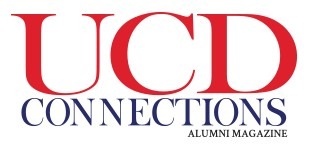
AGRICULTURE
The role of farming families
Last summer, the Just Transition in Agriculture and Land Use report offered 20 recommendations on how agriculture and land use could become part of the solution in addressing the climate crisis and issues of biodiversity loss, setting out a roadmap that would engage farmers and other stakeholders for an effective transition in which no one is left behind. Dr Edel Kelly from UCD’s School of Agriculture and Food Science and Professor Kevin O’Connor from the University’s School of Biomolecular and Biomedical Science were part of the working group for the report, and Dr Kelly is currently involved in phase two of the Government’s land use review, which recognises the role that farm families play as custodians of our environment.
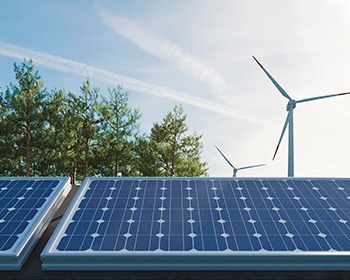
ENERGY
Community response to energy transition
As part of last year’s selected strategic priority projects from UCD’s Earth Institute, Irish Energy Narratives in the Transition (IE-NARR) sets out to host workshops at three key sites across Ireland to explore how communities interpret and experience various energy transitions. The shift from fossil fuels to offshore wind in rural communities in Co Clare and Co Galway, and the transition to renewable infrastructures tied to data centres in west Dublin are the selected focus points of this project, which is led by Dr Treasa de Loughry from the School of English, Drama and Film, Dr Tomas Buitendijk from the School of Business, and Dr Patrick Brodie from the School of Information and Communication Studies.
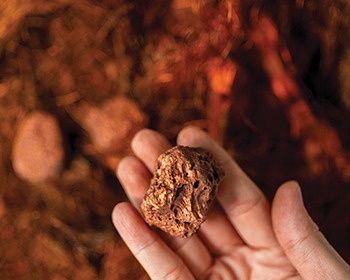
MATERIALS
Social acceptance for critical minerals
Critical raw materials, including minerals such as copper and lithium, are essential in the production of renewable energy technologies, and have seen a steep rise in demand. VECTOR is a Horizon Europe research project that is assessing the challenges of responsible and sustainable extraction by integrating social science, geoscience and data science to produce human-centred solutions to current supply issues. The project has partners spanning Europe, including iCRAG, the SFI Research Centre in Applied Geosciences hosted at UCD, and includes researchers from the UCD Schools of Earth Sciences, Business, and Education. VECTOR is improving understanding of how Europe can responsibly move towards a sustainable supply of critical raw materials to produce low-carbon technologies. Learn more at www.vectorproject.eu.

FASHION
A FReSCH take on the industry
Conducted at the UCD Centre for Business and Society, the FReSCH (Fashion’s Responsible Supply Chain Hub) project looked at the transition to a low-carbon and circular fashion industry, seeking to understand the economic and environmental factors as well as the trade-offs and tensions therein. Funded by the European Commission, this project examined fashion brands as well as their first, second and third-level suppliers to get a full picture of this industry and the experiences of its workers. For their research, Professor Donna Marshall and Dr Hakan Karaosman were recognised as Sustainability Thought Leaders in Vogue’s ‘Business 100’.

LABOUR
The evolving world of work
The changing world of work is the focus of the TransEuroWorkS project, which has €3.4m in funding and involves ten partners across eight countries, with Dr Dorota Szelewa from the School of Social Policy, Social Work and Social Justice leading UCD’s involvement. This interdisciplinary research into new forms of work and labour market changes brings together economics, political science, social psychology and sociology. It focuses on three key transformations impacting the future of work: technological change, internationalisation and decarbonisation. As well as tracing the impact of a green transition in this context, this project will explore how the EU can be more resilient and responsive to these changes.

INCLUSION
Investigating cumulative discrimination
Funded by Horizon Europe, the EqualStrength project involves ten European institutions coordinated at UCD by the Geary Institute for Public Policy. With Dr Mathew Creighton from the School of Sociology as principal investigator and Emma Barron from the Geary Institute as project manager, EqualStrength will investigate cumulative and structural forms of discrimination in Europe. Using field/survey experiments, policy analysis and focus groups, the project will explore the mechanisms and experience of discrimination that targets Muslim, Roma and Black minorities in Europe. The project’s ultimate goal is to couple our understanding of the experience and cause of discrimination with a broader, structural, cumulative and society-wide perspective.

HOUSING
Housing inequality across Europe
Professor Michelle Norris, director of the UCD Geary Institute for Public Policy, has led more than 30 research projects on housing policy and urban regeneration. Her latest is EqualHouse, an ambitious €3.4m Horizon Europe project involving 12 organisations across the EU. This project, which sets out to identify, analyse and tackle housing inequality across Europe, will be implemented between 2024 and 2028. Through transdisciplinary and trans-national research, EqualHouse will examine the scale, form and dynamics of housing inequality and propose innovative, inclusive and sustainable solutions that have been co-created with policy makers and implementers.

HERITAGE
Fostering a shared, sustainable culture
Shared cultural heritage can be unifying and add value to communities. The HeritACT project aims to provide a toolkit for engaging communities in cultural heritage and to create HeritHubs as community spaces. A pilot project in Ballina, Co Mayo, for example, will explore the town’s integral relationship between the natural and built environment, with the local library selected as its HeritHub. HeritACT also sets out to preserve ecosystems and enhance communities’ relationship with nature in line with the European Green Deal. Dr Chiara Cocco from UCD’s School of Architecture, Planning and Environmental Policy and Dr Philip Crowe, co-founder of the UCD Centre for Irish Towns, are running activities for this project.

DIGITAL LITERACY
Turning consumers into prosumers
The DIGITISE project has just commenced to enable digital literacy and empower EU citizens to take an active role in the energy transition. Advanced technologies such as AI, digital twins and distributed ledgers will be integrated into an end-to-end consumer empowerment framework that will be validated in a living lab as well as across four large-scale demonstration sites in Greece, Spain, Croatia and Ireland. Dr Dimitris Chatzopoulos from the School of Computer Science represents UCD on the DIGITISE project as one of its 11 primary investigators located across Europe.
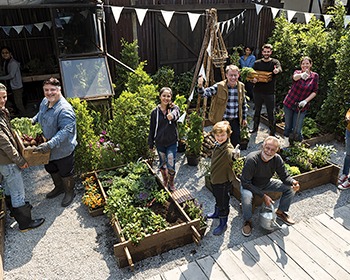
CITY LIFE
Connecting cities with nature
The EU-funded CONNECTING Nature project concluded in 2022 after five years of co-developing the policy and practices necessary to implement nature-based projects in urban settings. This project brought together inputs from academia, local government, SMEs, community groups and NGOs to form a reference framework for transitioning ambassadors to globalise the approach in targeted ‘multiplier’ cities. It included 30 partners from 16 countries across Europe, with Professor Francesco Pilla and Louise Dunne leading UCD’s contribution. While the research has concluded, the project is sustained through the sharing of resources and tools, and the creation of three spin-out enterprises which continue to facilitate and implement nature-based solutions.

DEMOCRACY
Nurturing public participation
Responding to the EU’s call to develop deliberative and participatory democracies, the Inclusive Science and European Democracies (ISEED) project aims to mitigate rising threats to European democratic values of inclusion, participation and diversity. This international project involves researchers from Italy, France, Poland, Norway, Denmark, Spain, Bulgaria, Uruguay, the UK and Ireland, all setting out to explore citizen science engagement practices that inspire and encourage people to actively participate in the democratic governance of Europe. It is an interdisciplinary project that combines theoretical analysis with empirical research. Dr Michael O’Grady from the UCD School of Computer Science is one of the contributors on ISEED, which recently released a series of policy briefs for the European Commission.
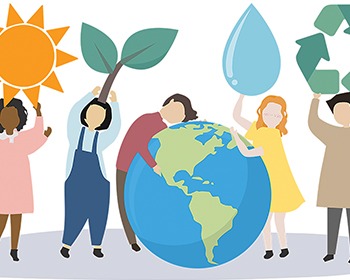
POLLUTION
Changing behaviours with citizen science
The I-CHANGE project to increase citizens’ involvement in the European Green Deal began in 2021 and will conclude next year. The aim of this project is to show that it’s possible to change people’s behaviour, influencing their climate consciousness, through citizen science. As part of this project, living labs in eight different countries encourage hands-on participation in the monitoring and assessment of environmental data. At the Dublin living lab at UCD, for example, Dr Anna Mölter tracks and shares traffic and air quality data, and engages schoolchildren as ‘change ambassadors’ to influence a reduction in emissions at school gates.
